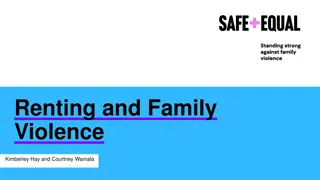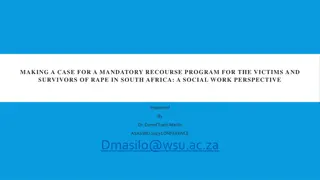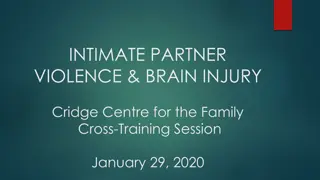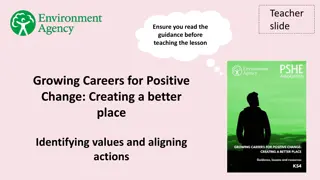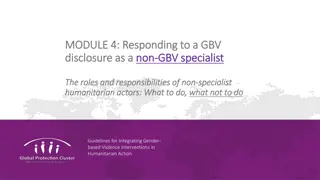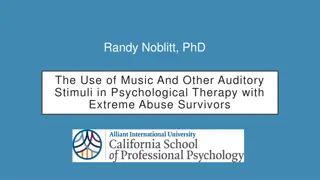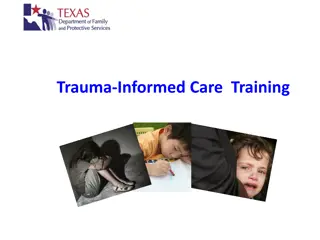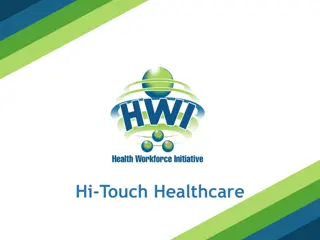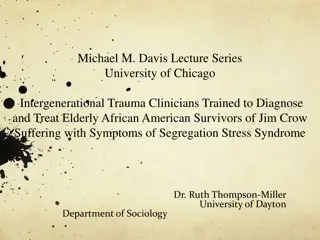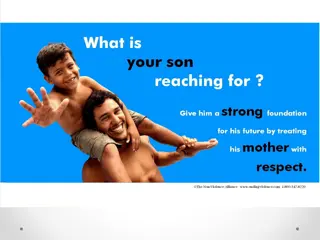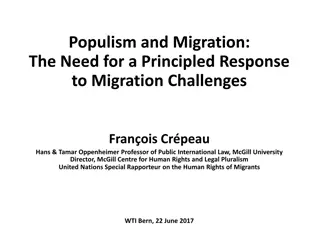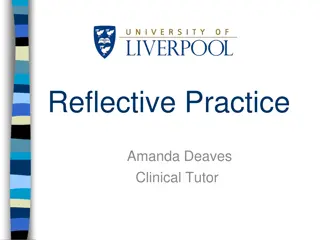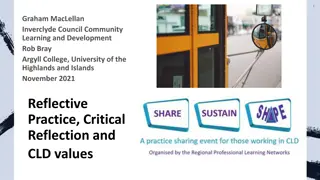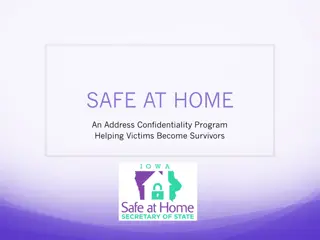Empowering Survivors: A Principled Approach Through Self-Reflection and Values Clarification
Empower survivors by debunking myths, promoting self-reflection, and adopting a survivor-centered approach. Understand the influence of personal values, biases, and behaviors in supporting survivors' recovery and agency. Embrace neutrality, self-awareness, and survivor-centric actions to ensure dignity, respect, and safety in survivor interactions.
Uploaded on Oct 08, 2024 | 1 Views
Download Presentation

Please find below an Image/Link to download the presentation.
The content on the website is provided AS IS for your information and personal use only. It may not be sold, licensed, or shared on other websites without obtaining consent from the author.If you encounter any issues during the download, it is possible that the publisher has removed the file from their server.
You are allowed to download the files provided on this website for personal or commercial use, subject to the condition that they are used lawfully. All files are the property of their respective owners.
The content on the website is provided AS IS for your information and personal use only. It may not be sold, licensed, or shared on other websites without obtaining consent from the author.
E N D
Presentation Transcript
2 Caring for survivors: A principled approach
Self-reflection and values clarification GROUP EXERCISE Reflecting on our values 2 Module 2
Myths and reality Myth: "She provoked the assault because of her sexy dress. Reality: Violence and abuse is never the fault of the survivor. Myth: A man can protect himself. Reality: Anyone can be subjected to sexual violence. Myth: Rape turned him gay. Reality: Gay and heterosexual men and boys are both subjected to rape. Sexual orientation is not a cause or consequence of sexual violence. Myth: If I had an erection, I must have enjoyed it. Reality: An erection is a common, uncontrollable physical response that does not reflect desire or pleasure. Myth: A sex worker can't be raped. It's their job. Reality: Consent applies to everyone, in every situation. Myth: Women don't commit sexual violence." Reality: Anyone with power can sexually harm another person. The large majority of perpetrators are men. Some women also perpetrate sexual violence, particularly against children and adolescents. 3 Module 2
Self-reflection and values clarification The possibility that information will be withheld or distorted by interpretation because of our attitudes and beliefs is something to be avoided at all costs. If we understand that one or more characteristics of the survivor makes it difficult for us to maintain an impartial position, we should consider standing aside for another linguistic and cultural mediator (LCM) (and work to to address our biases). We must be aware of our own biases, as an important way to be professional. We have a duty to remain neutral and to help survivors, regardless of our personal views. 4 Module 2
Recap Self-awareness is a lifelong journey. It is important to have an awareness of our values as they inform our beliefs and attitudes in relation to everything. We need to understand that values underpin beliefs and beliefs underpin behaviour. How we and others behave is a reflection of our beliefs and values. 5 Module 2
A survivor-centred approach Module 2 6
Survivor-centred approach A survivor-centred approach aims to put the rights of each survivor at the forefront of all actions and ensure that each survivor is treated with dignity and respect. By putting the survivor at the centre of the process, such an approach promotes their recovery, reduces the risk of further harm and reinforces their agency and self-determination. Practicing a survivor-centred approach means establishing a relationship with the survivor that promotes their emotional and physical safety, builds trust and helps them to restore some control over their life. 7 Module 2
Guiding Principles A survivor-centred approach is applied through four principles: Confidentiality Safety Respect Non-discrimination 8 Module 2
Confidentiality Why is it important? Confidential collection of information during interviews Confidentiality promotes safety, trust, dignity and empowerment. People have the right to choose to whom they will, or will not, tell their story. Sharing information only on a need-to-know basis or in line with laws and policies Breaching confidentiality inappropriately can put the survivor and others at risk of further harm. Storing any information about the survivor securely If service providers do not respect confidentiality, others will be discouraged from coming forward for help. What does it mean? Obtaining informed consent from the survivor before sharing any information, including in the context of a referral Confidentiality means not disclosing any information at any time to any party without the informed consent of the person concerned. 9 Module 2
Exceptions to confidentiality There can be exceptions to confidentiality, and it is very important that the survivor (especially children/young people and their caregivers) knows what the limits are. Limits include: Situations in which there is the threat of ongoing harm to a child; and where the need to protect them overrides confidentiality. Situations in which laws or policies require mandatory reporting of certain types of violence against children. Situations in which the survivor is at risk of harming themselves or others, including threats of suicide. Situations involving sexual exploitation or abuse by humanitarian or peacekeeping personnel. 10 Module 2
Safety Why is it important? Survivors may be at high risk of further violence sexual and otherwise from: Perpetrators People protecting perpetrators Members of their own family. What does it mean? Every person has the right to be protected from further violence. Every child has the right to be protected from harm, and as adults, we have responsibilities to uphold that right. 11 Module 2
Safety The concept of safety includes physical safety and security as well as psychological and emotional safety. Consider the safety needs of: Survivors; Family members and supporters; and Those providing care and support. 12 Module 2
Respect Why is it important? Having a validating, non-blaming and non- judgemental approach Every survivor has the right to be treated with respect and dignity and to make choices about what happens. The response of the service provider can either promote dignity and empowerment or cause further distress and harm. What does it mean? Valuing the survivor and caring about their experience, history and future The survivor makes decisions about care and this is valued and upheld Self-determination means respecting the dignity, wishes and choices of survivors, and allowing them to be in control of the helping process by deciding who to tell and what action to take. Failing to respect dignity and self-determination can increase feelings of helplessness and shame, reduce the effectiveness of interventions, cause re-victimization and further harm, and perpetuate harmful norms. 13 Module 2
Non-discrimination What does it mean? All people have an equal right to the best possible assistance without unfair discrimination on the basis of: Gender Disability Race, ethnicity or tribe Colour Language Religious or political beliefs Status or social class, etc. 14 Module 2
Informed consent The voluntary agreement of an individual who has the legal capacity to give consent. To provide informed consent, the individual must have the capacity and maturity to know about and understand the services being offered and be legally able to give their consent. 15 Module 2
Informed consent To ensure consent is informed, service providers must provide the following information to the survivor: All the possible information and options available to the person so she/he can make choices. Inform the person that she/he may need to share his/her information with others who can provide additional services. Explain to the person what will happen as you work with her/him. Explain the benefits and risks of services to the person. Explain to the person that she/he has the right to decline or refuse any part of services. Explain limits to confidentiality. 16 Module 2
Best interest of the child Why is it important? The primary purpose of intervening is to provide care, support and protection for individual children. What does it mean? Every child is unique and will be affected differently by sexual violence. Decisions and actions affecting them should reflect what is best for the safety, well-being and development of that particular child. 17 Module 2
Mandatory reporting Mandatory reporting refers to state laws and policies that mandate certain agencies and/or people in helping professions (teachers, social workers, health staff, etc.) to report actual or suspected child abuse (e.g., physical, sexual, neglect, emotional and psychological abuse, unlawful sexual intercourse). Mandatory reporting can also be mandated for cases of certain types of violence against women (e.g., intimate partner/domestic violence, rape). To comply with mandatory reporting laws, service providers must have a thorough understanding of the laws in their setting. See Handout 8: Mandatory reporting 18 Module 2
Mandatory reporting To be modified for setting 19 Module 2
Mandatory reporting To be modified for setting 20 Module 1
x GROUP WORK Guiding Principles and Linguistic Cultural Mediation 21 Module 2
Recap The survivor-centred approach is important because it puts the rights of each survivor first at the centre of all actions. For LCMs, practicing a survivor-centred approach means establishing a relationship with the survivor that promotes the survivor s emotional and physical safety, builds trust and helps the person regain some control over their life. The survivor-centred approach is applied through the Guiding Principles that should guide the work of everyone, including LCMs, in all interactions with the survivors. We should remember to do no harm and make sure that our interventions with survivors follow the Guiding principles. 22 Module 2
Recap The Guiding Principles for working with survivors are: Confidentiality Safety Respect Non-discrimination 23 Module 1


